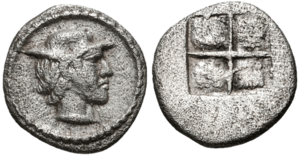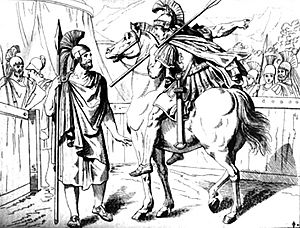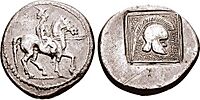Alexander I of Macedon facts for kids
Quick facts for kids Alexander I |
|
|---|---|

A silver coin (called an obol) of Alexander I, made around 460–450 BC. It shows a young man's head on one side and a special square design on the other.
|
|
| King of Macedon | |
| Reign | c. 498/497–454 BC |
| Predecessor | Amyntas I |
| Successor | Perdiccas II |
| Born | ? |
| Died | 454 BC |
| Spouse | unknown |
| Issue more... |
|
| Dynasty | Argead |
| Father | Amyntas I |
Alexander I (Ancient Greek: Ἀλέξανδρος, romanized: Alexandros; died 454 BC) was a powerful ruler of the ancient Greek kingdom of Macedonia. He was king from about 498 BC until his death in 454 BC. People also called him Alexander the Philhellene, which means 'lover of Greece' or 'Greek patriot'. After he died, his oldest son, Perdiccas II, became the next king.
Contents
Alexander I: King of Macedon
Alexander was the only son of Amyntas I, who was the previous king. His mother's name is not known for sure. He also had a sister named Gygaea.
When Alexander became king, Macedonia was under the control of the powerful Persian Empire. This had been true since his father's time. Even though they were under Persian rule, Macedonia still had a lot of freedom to govern itself.
In 492 BC, a Persian general named Mardonius made Macedonia a more direct part of the Persian Empire. This meant Persia had more control.
Alexander's Role in the Persian Wars
Alexander played a tricky role during the Persian Wars, which were big conflicts between the Greeks and the Persians. The Greek historian Herodotus wrote that Alexander worked with the Persian king Xerxes. He even acted as a representative for the Persian governor Mardonius during peace talks after the Persians lost the Battle of Salamis in 480 BC.
However, Alexander also secretly helped the Greek city-states. He often gave them supplies and advice. For example, before the important Battle of Plataea in 479 BC, Alexander warned the Greeks about Mardonius's plans. He also told them about a different path the Persian troops might take.
After the Greeks won the Battle of Plataea, the Persian army tried to escape back to Asia Minor. Alexander's forces attacked many of the retreating Persian soldiers near the Strymon river. After the Persian Wars ended, Alexander was able to make Macedonia fully independent again.

Alexander the Philhellene
Alexander wanted to show that Macedonians were true Greeks. He said his family came from Argive Greeks and the famous hero Heracles. Because of this claim, a group of judges allowed him to compete in the Ancient Olympic Games, possibly in 504 BC. This was a big deal because only Greeks were allowed to participate.
Alexander admired the culture of Athens, a leading Greek city-state. He supported famous poets like Pindar and Bacchylides, who even wrote poems for him. It was around this time that he earned the nickname "philhellene," meaning 'lover of Greeks'.
Issue
Alexander and his wife had at least six children. His most famous child was Perdiccas II, who became king after him. Other children included Menelaus, Philip, Amyntas, Alcetas, and a daughter named Stratonice.
See also
- Ancient Macedonians
- List of ancient Macedonians
 | Toni Morrison |
 | Barack Obama |
 | Martin Luther King Jr. |
 | Ralph Bunche |



